Curtain Call with Benjamin Bernheim and the Opera Studio
Concert with Benjamin Bernheim and young artists from the International Opera Studio
with scenes and arias from Verdi's Rigoletto, as well as Massenet's Manon and Werther.
Tickets at CHF 60 each for the concerts can be purchased from Wednesday, December 9, 2020, 11.00 am, exclusively by telephone on +41 44 268 66 66. The ticket office can be reached by telephone from Monday to Friday, from 11.00 am to 6.00 pm.
In accordance with the Opera House's protection concept and federal guidelines, a maximum of 50 tickets will be sold.
«Curtain Call» is presented by 
The workshops are made possible through the support of the Friends of Zurich Opera.
Past performances
December 2020
16
Dec19.00
Curtain Call mit Benjamin Bernheim und dem Internationalen Opernstudio
Concert with Benjamin Bernheim and young artists from the International Opera Studio
Good to know
Curtain Call with Benjamin Bernheim
Abstract
Curtain Call mit Benjamin Bernheim und dem Internationalen Opernstudio
During the Advent season, with the generous support of Zürich Versicherung and the Friends of Zurich Opera, we present the series Curtain Call. Prominent singers will join the young talents of the International Opera Studio on an equal footing and together create a concert evening. During a three-day workshop, Diana Damrau, Anna Bonitatibus, Thomas Hampson and Benjamin Bernheim will work with the young singers on key works from the vocal repertoire, scenes from 18th and 19th century operas, and classic Lieder repertoire. The results will be presented live on stage to a small audience. The 50 spectators in attendance will have the unique opportunity to follow the concert from an unusual perspective. This concert series is also the prelude to our anniversary year - 60 years Friends of Zurich Opera and 60 years International Opera Studio.
Mezzo-soprano Anna Bonitatibus is at home in the baroque and bel canto repertoire. On 15 December, she will open the series with works by Rossini and Mozart, together with the young singers of the International Opera Studio. On 16 December, rising star Benjamin Bernheim and the young artists follow with arias and scenes from Verdi's Rigoletto and Massenet’s Manon and Werther. On 17 December, star soprano Diana Damrau gets in the mood for Christmas and joins the International Opera Studio to present songs by Schubert, Schumann, and Brahms. Last but not least, Thomas Hampson and the young singers will present scenes from Mozart's Così fan tutte and selected songs by Haydn, Beethoven, and Schubert on 18 December.
All concerts will be recorded with several cameras. In addition, a camera team will accompany all the artists during the workshops and observe the development of the musical program backstage. These impressions will be presented as short documentaries. The Curtain Call concerts and documentaries will be digitally broadcast over Christmas and New Year via our homepage.
Ticket purchase concerts
Tickets at CHF 60 each for the concerts can be purchased from Wednesday, December 9, 2020, 11.00 am, exclusively by telephone on +41 44 268 66 66. The ticket office can be reached by telephone from Monday to Friday, from 11.00 am to 6.00 pm.
In accordance with the Opera House's protection concept and federal guidelines, a maximum of 50 tickets will be sold.
Tell us Ziyi...

When and why did you decide to become an opera singer?
I was born in a musical family. My parents are both singers. My dad is a tenor and my mom is a Chinese folk singer. I've been singing since I was a child. I started in a choir. The formal beginning of opera was in music high school. It's been 10 years now. Learning to sing opera is a gift I got from my father. He always supports me as a voice teacher.
If I hadn't become an opera singer, I'd be …
I think I have a feeling in art, and I would like to be a painter if I wasn't a singer.
Which was your most precious experience on stage so far?
I played the part of the shepherd boy in «Tosca» when I was eight years old. It was the first time in my life that I really experienced what opera is and how to work with conductors and orchestras. I only sang a few lines, but it was a very valuable experience for me.
… the most embarrassing moment?
I didn’t really have embarrassing moment. The most embarrassing thing was I stepped on my dress and I nearly fell over.
… the biggest challenge?
When I was 17, I had a concert with my father in the Great Hall of the People. It was the first time I faced an audiences of 10’000.
And what would be your biggest dream?
For Chinese people, it is very fortunate to study abroad and to work in a good opera house. I hope to sing in many houses in the future, so that they can understand the voices of Chinese singers.
Do you have a lucky charm or a ritual before going on stage?
Tell yourself: You are the best! Get on stage in a good, positive mindset.
My secret weapon to prevent hoarseness:
I don't have any special weapons. Eating well and sleeping well, and the most important thing is to be happy!
Which opera character do you identify with the most and why?
I like Adina in «L'elisir d'Amore». She’s confident, smart and knows what she wants.
This song speaks out of the fullness of my heart:
Manon‘s Gavotte says: «Use up your days without counting them, all of your days! Let's love, laugh, and sing without stopping, while we're still only twenty!» That's what I've always believed in and what I've always done. People must keep happy to enjoy every day and bring happiness to everyone. I also sang this aria when I auditioned for IOS at Opernhaus Zürich.
Which is you favorite place in Zürich and why?
I haven't been to many places yet because of the global crisis. But I like to sit by the lake and chat with my friends.
Ziyi Dai, soprano, comes from China.
The twenty-four-year-old has been a member of the IOS since the 2O/21 season.
Tell us Lina...

Lina Dambrauskaité
«When I'm on stage, I feel like I'm in a completely different world, somewhere, where time flows differently and you can be whoever you want. To me, opera is the most beautiful form of storytelling and each character I play finds its way to my heart. The stories are so timeless and we can all find a part of us in them.»
When and why did you decide to become an opera singer?
I fell in love with opera the moment I set a foot on stage. I’ve been singing since I was 5 years old and when I was 14, I was fortunate to participate in a production of «Boris Godunov» at the Lithuanian National Opera. It was right there and then that I truly fell in love with opera and haven’t looked back since. To me, it was and still is pure magic. I truly consider opera to be one of the pinnacles of art. It showcases the best of us, the humanity, and what we’re capable of when we work together. The stories that opera tells are timeless. Each of us will find a character in opera that we can relate to, because in that moment, on stage, that person is experiencing something we’re familiar with – love, grief, passion, anger… It brings me such joy to be a little part of a story that is brought to life through the most beautiful language we have – music.
If I hadn't become an opera singer, I would be …
... a criminal psychologist!
Which was your most precious experience on stage so far?
Each and every performance is very special, but the opening night of Händel’s «Semele» with the Royal Academy Opera comes to mind. I was lucky enough to sing Semele herself AND to work with the wonderful Laurence Cummings!
… the most embarrassing moment?
Not so much as embarrassing, but most of all nerve-wracking. I was really ill and sang a show without being able to speak, but for some reason, I could sing just fine. The problem was the spoken dialogue, which I croaked out like a frog.
… the biggest challenge?
Having to passionately kiss several men on stage while my boyfriend was in the audience. However, he took it quite well!
And what would be your biggest dream?
To just continue singing.
Do you have a lucky charm or a ritual before going on stage?
I do! I carry a pendant that my parents gave me as a gift for good luck. Usually, the costumes don’t allow it to show, so I tuck it away in my shoe!
My secret weapon to prevent hoarseness:
Lots of sleep, water and no dairy before singing.
My idol:
Natalie Dessay. She’s a force of nature.
Which opera character do you identify with the most and why?
Probably Susanna. She’s incredibly smart, witty and resourceful. She always sticks to her principles and keeps her pride because of it. Also, she doesn’t need power or money to be happy, she’s perfectly content with what she has in life and makes the best of it!
This song speaks out of the fullness of my heart:
Muse – «Butterflies and Hurricanes»
Which is you favorite place in Zürich and why?
The lakeside just beside the Opera House. It was the first thing I saw when I arrived in Zurich. It was the middle of a very hot summer and I remember enjoying the relaxed atmosphere all around, lots of happy people chatting, swimming, and feeding the swans or the seagulls.
What is your favorite word in Swiss German?
«Schätzli», the meaning and the word itself are very cute!
Lina Dambrauskaite, soprano, comes from Lithuania.
The twenty-eight-year-old has been a member of the IOS since the 19/20 season.
Tell us Yannick...
When and why did you decide to become an opera singer?
When I was about 25 years old and already in my studies at university. It came much more naturally to me than playing an instrument and it gave me always so much joy to perform.
If I hadn't become an opera singer…
I'd be a political scientist
Which was your most precious experience on stage so far?
Singing in the choir under the baton of Maestro Christoph Eschenbach the «2nd Symphony» of Gustav Mahler.
… the most embarrassing moment?
Having learned the wrong piece for a concert and then side-reading in the dress rehearsal.
… the biggest challenge?
Studying and learning the role of Leporello by heart in 2 and a half weeks
And what would be your biggest dream?
Never losing my love for music
Do you have a lucky charm or a ritual before going on stage?
I do a short meditation to focus.
My secret weapon to prevent hoarseness:
Take one day off a week when I don’t sing at all.
My idol:
Giorgio Zancanaro, Fritz Wunderlich and Tito Gobbi
Which opera character do you identify with the most and why?
Guglielmo from «Così fan tutte». He thinks he is cleverer than he actually is.
This song speaks out of the fullness of my heart:
«Du bist die Ruh» (Schubert)
Which is you favorite place in Zürich and why?
The lake. The water is so incredibly clear and spending a summer day at the waterside is very relaxing.
What is your favorite word in Swiss German?
«Chuchichäschtli»
Yannick Debus, baritone, comes from Germany.
The twenty-nine-year-old has been with the IOS since the 2O/21 season.
Biographies
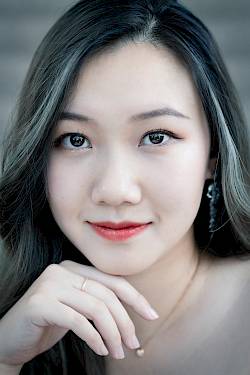
Ziyi Dai,
Ziyi Dai
Ziyi Dai, Sopran, stammt aus China und studierte am China Conservatory of Music in Peking sowie an der Manhattan School of Music und am Curtis Institute of Music in New York. Meisterkurse besuchte sie u.a. bei Javier Camarena, Enza Ferrari, Eric Owens und Ferruccio Furlanetto. Sie war Preisträgerin beim Huang Long Music Festival, beim Premiere Opera Foundation Gesangswettbewerb und beim Daniel Biaggi Palm Beach Opera Preis. Im Rahmen des Curtis Institute of Music sang sie Zerlina in Don Giovanni, Belinda in Dido and Aeneas und Miss Wordworth in Albert Herring. Zusammen mit ihrem Vater, dem Opernsänger Dai Yuqiang, sang sie in der Carnegie Hall in New York und am Kimmel Center for the Performing Arts Konzerte mit Arien von Verdi, Puccini und Lehár sowie mit bekannten Chinesischen Volksliedern. Von 2019 bis 2022 war sie Mitglied des Internationalen Opernstudios am Opernhaus Zürich und hier u.a. als Comtesse Adèle in Le Comte Ory, Marmeladenverkäuferin/Königstochter in Das tapfere Schneiderlein, als Athene in Die Odyssee, als Flaminia in Il mondo della luna und als Barbarina in Le nozze di Figaro zu erleben. 2022/23 sang sie am Opernhaus Zürich Papagena in Die Zauberflöte und beim Buxton International Festival Amina in La sonnambula. Ausserdem feierte sie jüngst als Zerbinetta in Adriadne auf Naxos am Opernhaus Zürich einen grossen Erfolg.
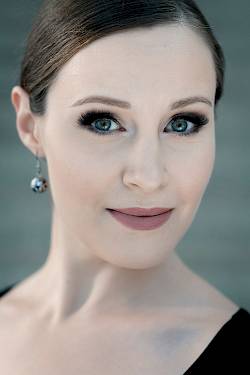
Lina Dambrauskaité,
Lina Dambrauskaité
Lina Dambrauskaité stammt aus Litauen und hat ihre Gesangsaubildung bei Sigute Stonyte an der Litauischen Musik- und Theaterakademie abgeschlossen. Ausserdem belegte sie Kurse bei Lillian Watson und Jonathan Papp an der Royal Academy Opera, wo sie 2017 ihr Londoner Debüt als Zerlina in Mozarts Don Giovanni gab. Zuvor debütierte sie 2015 als Barbarina in Mozart’s Le nozze di Figaro am Litauischen Nationaltheater für Oper und Ballett. Zu ihrem Repertoire gehören Thais in Händels Das Alexanderfest, Yniold in Debussys Pelléas et Mélisande sowie die Titelpartie in Händels Semele, Le Feu/Le Rossignol (L’Enfant et les sortilèges) und Vixen (The Cunning Little Vixen). Zudem hat sie an der Weltaustellung «Expo 2015» in Mailand Litauen repräsentiert und diverse Solopartien in Konzerten gesungen. Im Frühjahr 2019 hat Lina Dambrauskaité die Titelrolle in Leoš Janáčeks Das schlaue Füchslein an der Royal Academy Opera gesungen und im Herbst 2019 Cunigonde (Candide) am Litauischen Nationaltheater. Ab 2019/20 war sie Mitglied des Internationalen Opernstudios Zürich und sang hier u.a. in Belshazzar, Konrad oder Das Kind aus der Konservenbüchse, der Zauberflöte und Iphigénie en Tauride. Für ihre Interpretation von Marie (La Fille du regiment) und von Sophie (Der Rosenkavalier) erhielt sie 2022 den Golden Cross of the Stage.
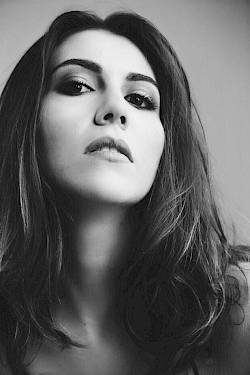
Sandra Hamaoui,
Sandra Hamaoui
Sandra Hamaoui, französisch-amerikanische Sopranistin, studierte am Konservatorium San Francisco und an der Juilliard School of Music in New York. Sie ist Preisträgerin zahlreicher Wettbewerbe; u. a. war sie Halbfinalistin bei den Metropolitan Opera National Council Auditions und gewann jeweils den ersten Preis bei den New England Regional Finals, beim West Bay Opera League Wettbewerb und beim Mary Trueman Gesangswettbewerb. Noch während ihrer Studienzeit sang sie die Titelpartie von Gounods Roméo et Juliette mit dem Canadian Vocal Arts Institute und Adina in L’elisir d’amore mit dem San Francisco Conservatory of Music am Kennedy Center. In der Spielzeit 2017/18 war sie Mitglied des Ensembles der Deutschen Oper Berlin, wo sie u. a. Ninetta (Die Liebe zu den drei Orangen) und Pamina (Die Zauberflöte) sang. Im Sommer 2018 gastierte sie am Verbier Festival, wo sie in Adriana Lecouvreur und in Rigoletto zu hören war. Als Ensemblemitglied am Opernhaus Zürich war sie u. a. bereits als Susanna in Le nozze di Figaro, Gilda in Rigoletto, Constance in einer Neuproduktion von Dialogues des Carmèlites, Nanetta in Falstaff, Gretel in Robert Carstens Neuproduktion von Hänsel und Gretel, Alice (Alice im Wunderland) und Miss Ellen (Lakmé) zu erleben. Jüngst debütiert sie in der Titelrolle von Roméo et Juliette mit dem Orchestre de Chambre de Genève.
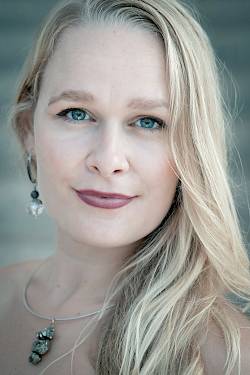
Siena Licht Miller,
Siena Licht Miller
Siena Licht Miller, deutsch-amerikanische Mezzosopranistin, studierte am Curtis Institute of Music und am Oberlin Conservatory of Music Gesang. Sie vervollständigte ihre Ausbildung mit Kursen an der Opera Philadelphia, der Santa Fe Opera, dem Opera Theatre of St. Louis und beim Aspen Music Festival. Sie ist Stipendiatin der Bagby Foundation, Preisträgerin der Metropolitan Opera National Council Auditions, der Marilyn Horne Rubin Foundation und der Gerda Lissner Foundation. Höhepunkte ihrer bisherigen Karriere waren die Rollendebüts als Hermia in A Midsummer Night’s Dream, Zweite Dame in Die Zauberflöte und eine der zwei Solopartien in der Uraufführung von Denis and Katya von Philip Venables an der Opera Philadelphia. Am Aspen Opera Center sang sie die Titelrolle in Ravels L’Enfant et les sortilèges unter der Leitung von Robert Spano. Regelmässig widmet sie sich zudem dem Liedgesang. So sang sie bei der Reihe The Song Continues in der Carnegie Hall zur Feier ihrer Mentorin Marilyn Horne und ging mit einem Rezital zusammen mit dem Pianisten Kevin Murphy auf Tournee durch die USA. In der Spielzeit 2020/21 war sie Mitglied des Internationalen Opernstudios in Zürich und sang hier u. a. in Maria Stuarda, Simon Boccanegra, Viva la mamma, Salome, Odyssee, im Ballett Monteverdi, in L’italiana in Algeri sowie Flosshilde in Das Rheingold. Seit der Spielzeit 2022/23 gehört sie zum Ensemble des Opernhauses Zürich und war hier jüngst in Barkouf, Salome, Anna Karenina, Lakmé, La rondine, Die Walküre, Götterdämmerung, Andrea Chénier und Ariadne auf Naxos zu erleben. Ausserdem sang sie am Theater Winterthur die Titelpartie in Händels Serse.
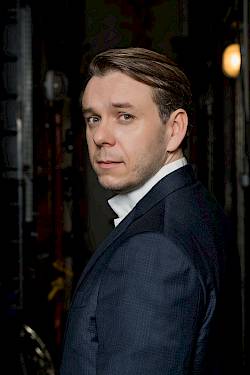
Benjamin Bernheim,
Benjamin Bernheim
Benjamin Bernheim studierte bei Gary Magby in Lausanne und war Mitglied des Internationalen Opernstudios und des Ensembles am Opernhaus Zürich. Der französische Tenor hat sich inzwischen als regelmässiger Gast an den renommiertesten Bühnen etabliert, u. a. an der Opéra de Paris, der Wiener und der Berliner Staatsoper und dem Royal Opera House Covent Garden. 2020 wurde er bei den Les Victoires de la Musique Awards als «Opernsänger des Jahres» ausgezeichnet und von Le Syndicat professionnel de la critique als «Musikalische Persönlichkeit des Jahres». Im selben Jahr erhielt sein Debütalbum einen «Diapason d’Or» und einen «Choc de Classica». Höhepunkte seiner bisherigen Karriere waren die Titelrolle in Faust (Opéra national de Paris, Lyric Opera of Chicago, Théâtre des Champs Elysées und Lettische Nationaloper), Roméo in Roméo et Juliette (Opéra national de Paris und Opernhaus Zürich), Rodolfo in La bohème (Opéra national de Paris, Opernhaus Zürich, Royal Opera House, Staatsoper Berlin und Wiener Staatsoper), Edgardo in Lucia di Lammermoor (Opernhaus Zürich, Wiener Staatsoper und Salzburger Festspiele) sowie Alfredo in La traviata (Teatro alla Scala, Royal Opera House, Opernhaus Zürich, Semperoper Dresden, Deutsche Oper, Opéra national de Bordeaux und Staatsoper Berlin). Er gab Liederabende u. a. bei den Salzburger Festspielen, dem Verbier Festival, beim La Grange au Lac, dem Théâtre des Champs-Élysées, der Philharmonie de Luxembourg und dem Wiener Konzerthaus. Jüngst gab er am Opernhaus Zürich sein Rollendebüt als Ruggero Lastouc in Puccinis La rondine. Benjamin Bernheim ist Exklusivkünstler der Deutschen Grammophon.

Yannick Debus,
Yannick Debus
Yannick Debus studierte Gesang an der Musikhochschule Lübeck, an der Hochschule für Musik Basel und an der Schola Cantorum Basiliensis. Parallel zu seiner Gesangsausbildung studierte er in Lübeck Musiktheorie und Gehörbildung. Während des Studiums sang er an den Theatern Kiel und Lübeck u. a. die Hauptrolle des Dichters in L’impresario in angustie (Cimarosa). Im Rahmen der Jungen Oper Schloss Weikersheim war er im Sommer 2017 in der Rolle des Vaters in Humperdincks Märchenoper Hänsel und Gretel zu erleben. Im Sommer 2018 sang er bei der Kammeroper Schloss Rheinsberg die Rolle des Guglielmo in Così fan tutte. Er war am Theater Basel in der Rolle des Kaisers Overall in Viktor Ullmanns Der Kaiser von Atlantis und als Figaro in Milhauds La mère coupable sowie bei den Innsbrucker Festwochen der Alten Musik als Emireno in Händels Ottone, re di Germania zu erleben. Von 2020-2022 war er Mitglied des Internationalen Opernstudios in Zürich und war hier u.a. als Kilian in Der Freischütz, als Sprecher und 2. Priester in Die Zauberflöte, als Hermann in Les Contes d’Hoffmann, als Thierry in Dialogues des Carmélites und als Pieter in Girl with a Pearl Earring zu erleben. Eine enge Zusammenarbeit verbindet ihn mit René Jacobs, mit dem er als Orpheus in Telemanns gleichnamiger Oper in Basel zu erleben war, 2022 als Apollo in Händels Apollo e Dafne, als Kilian und Ottokar in der CD-Release-Tournee vom Freischütz, und in Israel in Egypt. Am Opernhaus Zürich sang er diese Saison bereits Harlekin in Ariadne auf Naxos und wird zudem Rihms Lenz in Winterthur verkörpern sowie gemeinsam mit Hanna-Elisabeth Müller in Wolfs Italienischem Liederbuch zu hören sein.

Joanna Laszczkowska,
Joanna Laszczkowska
Joanna Laszczkowska wurde in Warschau geboren und schloss ihre Klavierausbildung an der Fryderyk Chopin Universität in Warschau ab. 2016 war sie Mitglied der Opera Academy am Teatr Wielki in Warschau und besuchte dort u.a. Workshops bei Eytan Pessen, Helmut Deutsch, Brenda Hurley, Neil Shicoff und Hedwig Fassbender. Als Korrepetitorin war sie im Rahmen der Opera Academy für die Produktionen About the Kingdom of Day and Night and Enchanted Instruments (Die Zauberflöte für Kinder) und The Miracle, or the Cracovians and the Highlanders tätig. Zudem war sie Teilnehmerin des ENOA Outreach Workshops in Aix-en-Provence und spielte 2019 Les Noces von Strawinsky am Teatr Wielki. 2019 war sie zudem Teilnehmerin beim Solti-Peretti Korrepetitions-Kurs in Venedig, wo sie von Richard Bonynge, Jonathan Papp und Anthony Legge unterrichtet wurde und beim Britten-Pears Young-Artist-Programme, welches von Antonio Pappano, Pamela Bullock und Julia Fisher geleitet wurde. Als Pianistin war sie beim Winter Vocal Course in Duszniki-Zdrój und bei der International Stanisław Moniuszko Vocal Competition engagiert. 2019 gewann sie am Teatro dell’Opera in Rom den Wettbewerb für Korrepetition des «Fabbrica» Young Artist Programs. Seit der Spielzeit 2020/21 ist sie Mitglied des Internationalen Opernstudios Zürich.

William Green,
William Green
William Green stammt aus Grossbritannien. Er studierte in Oxford Musik und schloss 2013 sein Studium mit Auszeichnung ab. Im Anschluss doktorierte er in Liverpool in Musikanalyse zu Richard Wagners Der Ring des Nibelungen. Er ist Preisträger des «Clifford Smith Prize» und erhielt 2013 das Duncan Norman Stipendium. Während seines Studiums dirigierte er sowohl das Oxford University String Ensemble als auch das Christ Church Orchestra in Oxford. Als Pianist war er u.a. mit Klavierkonzerten von Beethoven, Brahms, Mozart, Ravel, Rachmaninoff und Tschaikowsky zu erleben. Von 2018-2019 war er als Korrepetitor Mitglied des National Opera Studios in London. 2018 arbeitete er als Assistent der Musikalischen Leitung an der Hampstead Garden Opera in London für La traviata, als Korrepetitor an der British Youth Opera für The Rake’s Progress, für The Turn of the Screw am Barnes Music Festival und 2019 beim Monteverdi Chor mit dem Orchester Révolutionnaire et Romantique unter John Eliot Gardiner für Benvenuto Cellini von Berlioz. Im April 2019 gewann er den «Help Musicians UK Accompanist’s Prize» bei den Kathleen Ferrier Awards, und im Juli 2019 übernahm der die Musikalische Leitung für Violetta (einer reduzierten Version von La traviata) beim Grimeborn Festival. Seit der Spielzeit 2019/20 ist er Mitglied des Internationalen Opernstudios in Zürich.

Adam Rogala,
Adam Rogala
Pianist. A member of the Internationales Opernstudio – Opernhaus Zürich since 2019. A graduate of the Feliks Nowowiejski Academy of Music in Bydgoszcz, where he studied piano under Prof. Małgorzata Furche-Jurczyk. He had been a participant in the Opera Academy Young Talents Development Programme at the Teatr Wielki - Polish National Opera since 2016, training with Eytan Pessen, Izabella Kłosińska, Matthias Rexroth and Olga Pasichnyk. He had been a pianist/répétiteur for the singing classes at his Alma Mater since 2015.
He has taken part in many piano courses and workshops taught by teachers including Andrzej Jasiński, Mikhail Voskresensky, Alexei Orlovetsky and Kevin Kenner. He has been an accompanist for vocal masterclasses in Bydgoszcz, Lubostroń and Duszniki-Zdrój (Poland). As a répétiteur he has taken part in numerous courses and seminars led by artists such as Brenda Hurley, Thomas Barthel, Neil Shicoff, Helmut Deutsch, Hedwig Fassbender, Rosemary Joshua, Tobias Truniger, Jerzy Marchwiński, Ewa Podleś, Umberto Finazzi, René Massis, Paul Plummer, Tomasz Konieczny, Elizabeth Rowe, Martin Lloyd Evans, Andrzej Dobber, Einar Røttingen.
He has accompanied singers during vocal competitions in Poland and abroad. He has played chamber music in concerts and at festivals organized in Poland and around Europe by Sinfonia Varsovia, the Polish Radio National Symphony Orchestra, the Teatr Wielki - Polish National Opera, the Silesia Institution for Promoting and Popularizing Music, and Opera Nova in Bydgoszcz. As a répétiteur and later as a performer, he has worked on productions including About the Kingdom of Day and Night and Enchanted Instruments, which is an adaptation of Mozart’s The Magic Flute for children, and The Miracle, or the Cracovians and the Highlanders (Teatr Wielki - Polish National Opera). With soprano Beata Gramza, in 2017 he recorded a CD with songs by Feliks Nowowiejski for Ars Sonora as part of the four-CD album Nowowiejski w wielu wymiarach. In 2018 he took part in international workshops run by ENOA: Recitativo performance in Belgrade and Exzellenz-Labor Gesang in Weikersheim. In 2019 he was an accompanist of X International Stanisław Moniuszko Vocal Competition in Warsaw (Poland) and V Nationwide Krystyna Jamroz Vocal Competition in Busko-Zdrój (Poland).
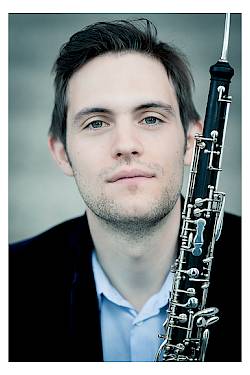
Clément Noël,
Clément Noël
Clément Noël wurde in Nancy geboren. Er studierte Oboe am Conservatoire National Supérieur de Musique et de Danse in Lyon bei Jérôme Guichard und bei Jean-Louis Capezzali, bei letzterem auch an der Haute École de Musique de Lausanne.
Seit 2010 ist er Mitglied der Philharmonia Zürich.
2014 gründete er zusammen mit KollegInnen aus dem Orchester das Labyrinth Ensemble, welches bisher mit Künstlern wie Alain Altinoglu, Julie Fuchs, Anna Stéphany und Benjamin Bernheim konzertiert hat. Regelmässig spielt er beim Budapest Festival Orchestra und beim Mahler Chamber Orchestra.
Clément Noël unterrichtet am Conservatorio della Svizzera Italiana als Assistent von Fabien Thouand.



